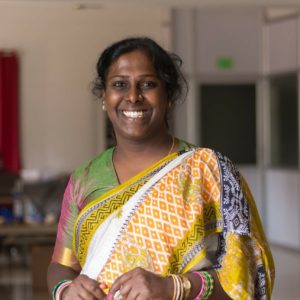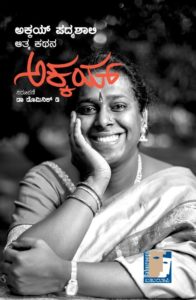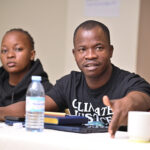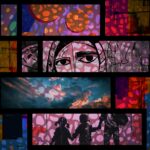This article was published more than 3 years ago.

Akkai Padmashali is an Indian transgender woman and activist. She is a founder of Ondede, an LGBTQ rights group supported by the Fund.
Growing up as a boy in Bangalore, Akkai’s family tried to dissuade her from wearing dresses or expressing her identity. She eventually left school and began to live openly as a transgender woman. To survive, she was a sex worker for four years. She became an activist to educate policy makers and communities alike about the discrimination and violence faced by transgender people. Akkai has spoken internationally about transgender rights and was invited to meet with former U.S. president Barack Obama when he visited India in 2017.
Her autobiography, Akkai, was published in Kannada (a language spoken predominately in her home state of Karnataka) in June 2021. It outlines her personal journey as she explores the struggles of the sexual minority community and the history of the LGBTQ movement in India. We spoke with Akkai about writing her book during the pandemic, her hopes for her community, and what transgender people in India truly need from allies. Note: some answers have been condensed or edited for clarity/length.
You’re a well-known activist in India. Why did you decide to write your story now? How do you hope it helps people connect with your community and transgender rights in India?
I wanted to tell my personal story, that of my community, and the systems we need to change in the country… A large part of my activism is to bring to light issues that sexual minorities face. Also, there isn’t much literature on working class sexual minorities in India.
Transgender people have been part of the LGBTQ equality movement for more than 25 years, but I couldn’t find the essence of the movement in their stories that have been published. I wanted to bring in a larger context around our activism.

Can you share a bit about the writing process and how people have responded to the book?
I planned to take four or five years, but I wrote the book in 2020 during the pandemic. I had three or four months in the house where I couldn’t go out to work. Ondede [Akkai’s organization] was able to do some financial assistance and other work with people but nothing in person.
We lost so many people during the COVID-19 crises. If COVID comes to me tomorrow, I may be dead. But my vision, belief, and perspective will be in this book. It’s not common to write your autobiography here until you’re 60 or 65 years old. So doing it at 36 brought me some criticism. But now I’ve broken that barrier too. So far, we’ve sold 2,000 books in Kannada.
The English version is set for release in November 2021. I worked with my friend Gowri [Vijayakumar] at Brandeis University. I narrated through Zoom meetings and she and her team worked to get it down. Prof Dominic from the Bangalore University was a huge supporter and he helped the retranslation into Kannada.
The translated book is titled Challenge to Sympathy. Can you share why you selected that title and how it reflects your outlook?
I want to show that it’s important to bring empathy, not sympathy, to current struggles in the LGBTQ community. The story of my book is simple: we are all human beings.
I came from a working class, non-English speaking background. I had no acceptance from family. Each piece of my story, from family to classmates to teachers, was about rejection. But self-acceptance and self-esteem brought me to this point to write this book. And l will still be targeted. But I need to speak about what happens in this country.
You are also a founder of Ondede, an organization that has helped achieve tremendous progress for LGBTQ people in India, including helping to overturn a colonial-era ban on same sex relations called Section 377. What issues is Ondede working to address today?
Ondede means “convergence”—we want to build a movement of support. Hence, we choose to walk with women’s rights groups, sexual minorities, children’s rights, and other socially excluded groups.
We’re still working to break the barrier on privacy. Overturning Section 377 did give the LGBTQ community proper clearance to enjoy benefits—the right to education, employment, mobility, etc. But privacy was not spoken about within judgement. I question what that means for sex workers, or for people who must beg in the streets (which remains criminalized).
There’s also still a social assumption that a transgender person doesn’t have an orientation or sexual feelings. We need to break that barrier. I think speaking out and saying my body, my right, I decide my gender and my sexuality has brought new understanding of what equality is about.
What can people who want to be allies do to support LGBTQ rights?
Being an ally is much bigger than being a friend. LGBTQ and transgender people are first human and everything else next. We are here to claim dignity. To be an ally, you must be open to listen to issues of sexual minorities. You must be willing to accept our community on our terms and understand in-depth issues first. And we want to understand you as well.
People as donors can invest in groups that work to dismantle unequal systems. At Ondede, we train leaders and work in coalitions on core issues like 1) economics: there’s a government mandate that transgender people must quit sex work and begging but then what livelihood is available; 2) education: there is still so much discrimination; and 3) violence: when there’s no safety it’s difficult to do anything else.


